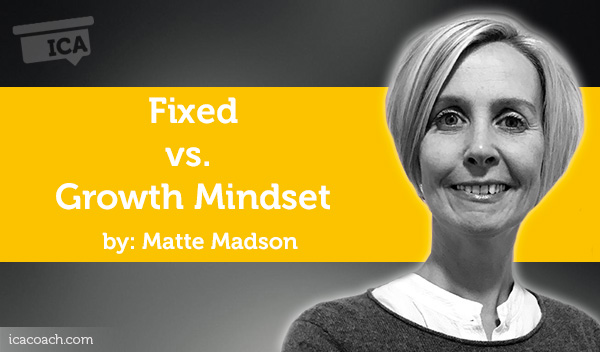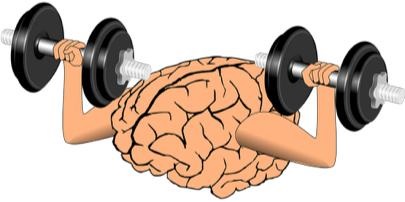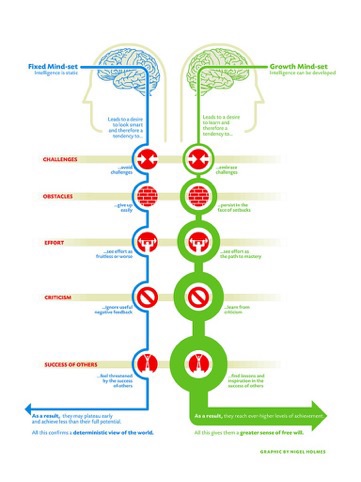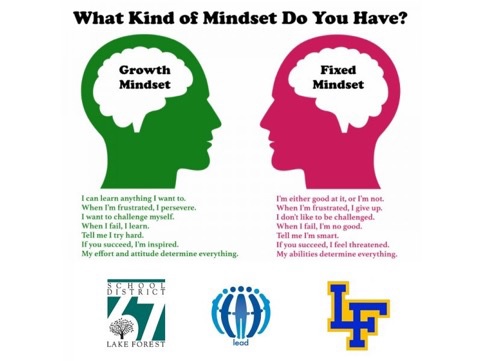
A Coaching Power Tool Created by Mette Madsen
(Life Coach, DENMARK)
This power tool is based on Dr. Carol S. Dwecks book “Mindset”
Around a year ago, I went to my kids school for an information meeting about the new school year. A lot of interesting things came up. One of the things, I noticed was that the teachers mentioned psychologist Dr. Carol S. Dweck and her science based studies and research about kids and adults having a fixed vs. a growths mindset.
According to Dr. Carol Dweck, studies shows that the view and mindset you adopt for yourself profoundly affects the way you live your life. Which again means that a simple belief have the power to transform your psychology and, as a result your life! It is interesting to see that this is based on psychology research and science. Scientists can see a difference in how the brain works depending on whether you have a fixed or a growth mindset. Scientists say, that the brain is like a muscle if you use it you can develop it.

What is the fixed Vs. growth mindset ?
With a fixed mindset you believe that you are not in control of your abilities, and you believe that skills are something you are born with. Your intelligence is something very basic about you, and you can’t change it very much. You can learn new things, but you can’t really change how intelligent you are. You believe that you have a very limited ability to develop new skills. If you have a fixed mindset and make a failure, you are likely to be very hard on yourself, people tell them self that they are a loser, idiot, total failure, and it is useless to keep on trying, Therefore people with the fixed mindset often give up on learning new things. They often fell they don’t have the skills and that making effort is useless.
A Growth mindset is based on the belief that your basic abilities are things you can cultivate through your efforts.
With a Growth mindset you believe that you are in control of your abilities, skills can be built and you can learn and growth.- Dr. Dweck
 With a growth mindset you have the belief that no matter how intelligent you are, you can always change it quite a bit and you can always substantially change how intelligent you, are if you make an effort.
With a growth mindset you have the belief that no matter how intelligent you are, you can always change it quite a bit and you can always substantially change how intelligent you, are if you make an effort.
If you want a growth mindset Dr. Carol Dweck recommend, that you put the template shown above on your mirror and look at it every day. This can actually it would help you to change your mindset.
People with a growth mindset also look at obstacles in a different way compared to people with a fixed mindset. With a growth mindset you will take the risk, confront the challenges and keep working until you reach your goal.
Case
This is a small case story from my own life that shows, that a mindset can be changed and also how to change it.
My daughter has always been fighting with her maths in the past she often said things like
I am never going to learn this, or I don’t have a maths brain!.
Last year my daughter got a new teacher and he started to introduce the children to Dr. Carol Dweck, and her studies around fixed or growth mindset. And it has had a great impact on her learning and attitude to learning new things in general.
The kids have done a lot of small assignment to identify whether they have a fixed or a growth mindset. Their teacher would give the kids a lot of things to help them develop the growth mindset. He has also given the kids a growth mindset journal which they have to write in every week.
It has been and still is incredible interesting to see how my daughter has been growing in her learning, and also in her learning attitude towards math. For the last 6 months, I have not heard her complain much about math.
Now she will tell me things like.
I just have to use a lot of time and practice on this, then I will solve the problem” or I just need an other strategy for this math problem” or nobody is born with a special math brain, so I can learn it too!
It is really amazing to see have this POWER TOOL has helped her.
Research has also shown that just because some people can do something with a little or no training, it does not mean that others can’t do it (and sometimes do it even better with training) This is so important, because many, many people with a fixed mindset think that your early performance tells you all you need to know about their talent and their future. Dr. Carol Dweck, say that
test scores and measures of achievements tell you where a student is, but don’t tell you where a student could end up
Power Tool and how to use it
With a growth mindset it is possible to develop new skills if your are willing to put an effort in reaching your goal.
I think that the tool makes it possible to reframe adults and kids perspectives on what is actually possible to achieve. It can give them hope for the future, and help them to see new opportunities in life.
I believe there is a lot of hope for life and the future in this reframing power tool, and that’s why, I would like to use the tool in my coaching and social work.
Having a growth mindset can potentially help you to let go of the felling of fear for making a mistake or failing, a feeling I think most people know.
In a growth mindset you see a failure as a result of your effort to try learning something new. You are just not there yet. There is a lot of power in the “not yet”…which mean that your are going in the right direction to reach your goal. When a person with a growth
 mindset makes a mistake, she just think I have to study harder or this challenge is interesting, I want to find out how to solve the problem.
mindset makes a mistake, she just think I have to study harder or this challenge is interesting, I want to find out how to solve the problem.
How to use this power tool in coaching
When I am coaching a client who are trying to reach a new goal in life, it might be anything, and find it hard to reach that goal or even find that it is impossible with his or her skills. I would like to ask them if they have a fixed or a growth mindset, and if they don’t know, I will ask them if the want an introduction to it.
If they are interested, I would like to help them to identify whether they have the growth or the fixed mindset.
This could be done by showing them the template above and also asking questions like:
If they discover that they have a fixed mindset, I would ask them if they want to keep it, or if they would like to put on a growth mindset instead of a fixed mindset.
If my client want to change their fixed mindset to a growth mindset, I would then ask the questions like:
I might also give them this small growth paper/journal, which might me helpful for them at home, when the fixed mindset is taking over.
Here is also 15 Ways to Develop a Growth mindset. ( Saga Briggs) Which I think might me helpful for client if they want to change their mindset.
- Acknowledge and embrace imperfections.
- View challenges as opportunities
- Try different learning tactics
- Replace the word “falling with the word learning’
- Stop seeking approval
- Value the process over the end result
- Cultivate a sense of purpose
- Celebrate growth with others
- Emphasize growth over speed
- Reward actions, not traits
- Praise effort before talent
- Use the word “yet
- Take risks in the company of other people
- Think realistically about time and effort, it take time to learn new things
- Take ownership over your attitude
I strongly believe that giving the client the power tool growth mindset can change the situation and even life’s.
Dweck, Carol Pages, 6, 8,10,12, 13, 53, 66, 244, 245, 246 Mindset. London:
Robinson, an Imprint of Constable & Robinson, 2017. Print.
www.opencolleges.edu.au, Sara Briggs